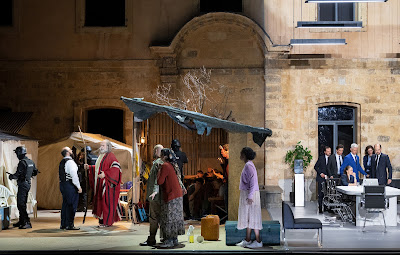Reviewed by James Karas
Lisa D’Amour has an uncanny ability to turn what appears mundane and perhaps pedestrian into an intriguing, stimulating and intelligent play. I am referring to Detroit, her 2010 work that is now playing at the Coal Mine Theatre in Toronto.
The situation could not be simpler. Two couples live next door to each other in suburb of an American city but have never met. One of the houses has been empty for a long time but is now occupied by Kenny and Sharon. Their neighbours, Ben and Mary, decide to invite the new couple that has just moved in for a barbecue. What could be simpler?
We want to find out more about the two couples of course. Ben and Mary have lived in their house for some years and they appear to be friendly and well-adjusted people. Almost. Ben worked for a couple of banks but was recently fired from his job. He wants to develop a financial planning business and run it on a website from home. Mary works as a paralegal and she likes to drink. Is she on the verge of being an alcoholic? Even their patio is frayed at the edges, their umbrella will not stay open and the sliding door is not sliding very well. They have no friends and we start surmising that this couple has issues that may be serious problems, no?
Kenny and Sharon’s house is owned by their aunt and they seem to have temporary permission to live there. They have no furniture and intend to move to better and perhaps permanent accommodation soon. They have just come out of rehab from serious addictions. Kenny works in a warehouse and Sharon works in a call centre. They have lived in all kinds of places including a hotel and can’t quite relate to the idea of neighbours with whom you get along. These people have real problems.
And that is just our introduction to the two couples. With D’Amour, you are well-advised to pay attention to the subtext because that is where the beauty and complexity of the play lie. Director Jill Harper points the way in her subtle handling of the script that looks so simple on the surface but is in fact psychologically complex and compelling.
The acting is outstanding. Diana Bentley plays Mary. She wats to be a suburban wife in a nice house where she and her husband can entertain their neighbours. Ben (Sergio Di Zio), as I said, dreams of setting up a consulting business but is incapable of doing anything. Kenny (Craig Lauzon) and Sharon (Louise Lamber) are pathetic people who lie about their past and even their names. All of them present a façade that cracks as we see the reality of their lives. Bentley, Di Zio, Lauzon and Lamberts give outstanding performances.
There is a fifth character called Frank who makes a short appearance and brings memories of the good old days of the neighbourhood. Eric Peterson plays Frank and he does a superb job even in a small role.
The set is
designed by Ken MacDonald who has to work within the severe limitations of the
Coal Mine Theatre. The space available is pitiful and he does his best in presenting
the adjoining houses of the two couples with scant room for much more. All is left
to our imagination.
Detroit is a subtle and complex play where we reach into the horrid past of four people who are trying to present an exterior of normality. They lie to each other and to us and in the hands of Jill Harper and the actors provide us with 90 minutes of riveting theatre.
__________
P.S. A postscript
is de rigueur about Coal Mine Theatre. The storefront on Danforth Avenue, Toronto
is an unacceptable venue for so talented a company. Where is the government or
the wealthy donor to give them funding for a proper space? Their choice of
plays deserves the highest commendation. I am not sure if the plays are chosen
by Ted Dykstra and Diana Bentley, the Chief Engineers of the company or by
other readers but the high quality of the choices and the supreme quality of
the productions deserve the highest praise but also funding for a better
theatre.
___________
Detroit
by Lisa
D’Amour continues until August 7, 2022, at the Coal
Mine Theatre, 1454 Danforth Ave. Toronto, M4J 1N4. www.coalminetheatre.com
James Karas is the Senior Editor - Culture of The Greek Press. This review appeared in the newspaper.














